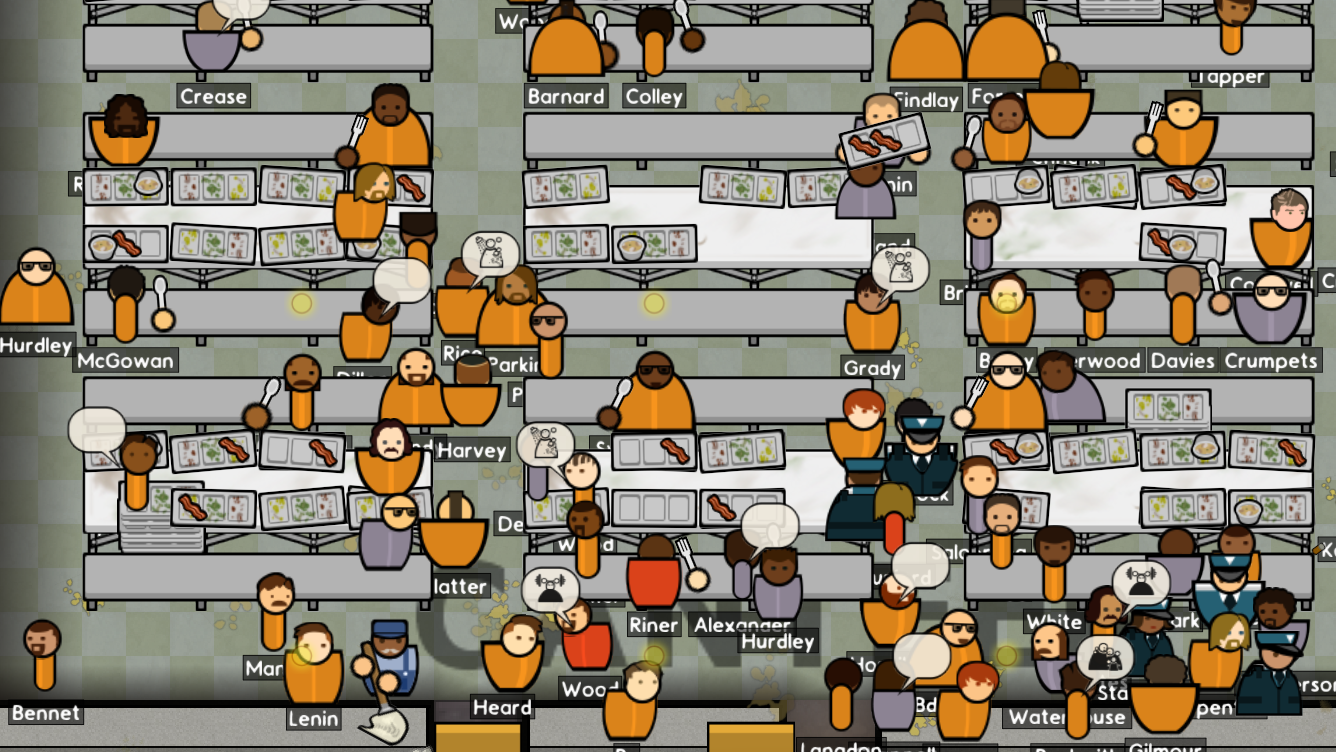Our Verdict
A complex, challenging, and grimly satisfying simulator.
PC Gamer's got your back
What is it? A sim about building and managing a prison
Expect to pay: $30/£20
Developer: Introversion Software
Publisher: Introversion Software
Reviewed on: Intel i7 x980 3.33 GHz, 9 GB RAM, Nvidia GeForce GTX 960
Multiplayer: No
Link: Official site
I was several hours into my first game of Prison Architect when I found myself humiliated. I'm talking genuine, utter, red-faced humiliation, complete with a trickle of perspiration and a vaguely sick feeling in the pit of my gut. I've been humiliated plenty of times in online games, but this was an entirely new experience for me in single-player.
I'd been playing Introversion Software's prison construction and management simulator the same way I play any other sim, by slowly expanding my network of buildings—cells, rec rooms, storage closets, administrative offices—while keeping an eye on my finances, staff, and current goals. Most of all, I'd been doing everything I could to meet the needs of my ever-growing population of inmates. If they complained about being hungry, I'd expand the kitchen, serve higher quality meals, and allow more time on their schedules for chow. If they complained about hygiene, a lack of recreation options, or that they missed their families, I'd stop everything and construct new facilities or activate new prisoner programs to accommodate them. As a result of this close attention I'd experienced no riots, no fist-fights, no unpleasantness of any kind. Everything seemed to be going great.
Then I received a notification that an escape tunnel had been found. Five prisoners in adjoining cells had smuggled in tools and burrowed to freedom right under my nose (and right under the prison's exterior wall). I immediately felt betrayed. I'd been bending over backwards to meet their needs, to run a clean, efficient, and extraordinarily humane prison. How could they do this to me? That's when the embarrassment hit, because something important and incredibly obvious simply hadn't dawned on me until that very moment: meeting an inmate's needs isn't the same thing as making them happy. Prison Architect isn't like other management sims where you deal with a restless and fickle population. There simply is no happy state for your residents. Maybe they don't want to start fires or lay into a guard with a power drill, but that doesn't mean they actually want to be there. It's prison. It's right in the title. No one wants to be there! Lesson learned, too late.
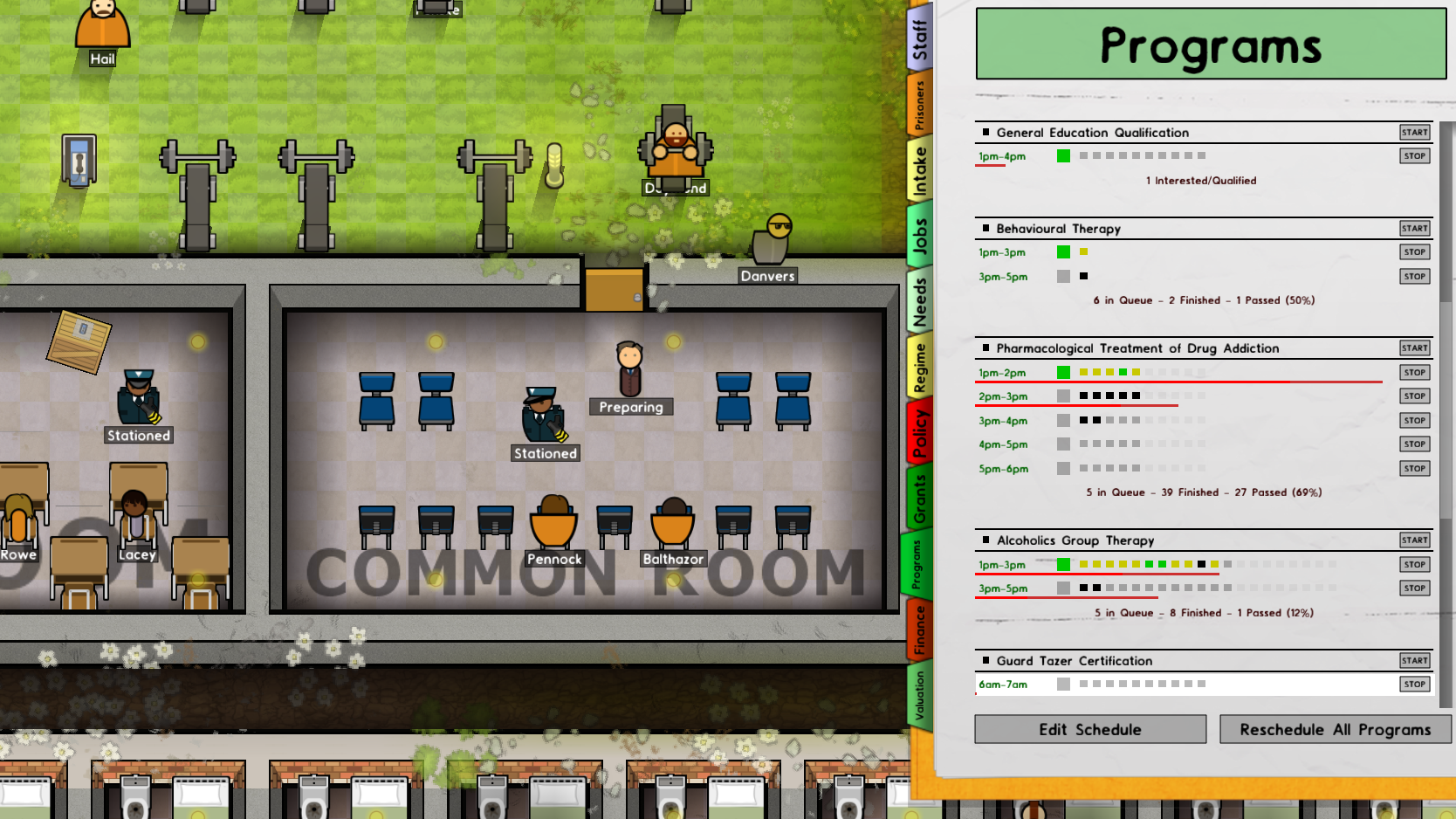
Building the prison of your dreams (or an inmate's nightmares) is accomplished in the same fashion as many other sims: drag an outline of a foundation, add doors, and pull electrical cables and water pipes into place. Designate the type of room it is and plop in the required equipment: cells just need a bed and toilet, offices need desks, chairs and file cabinets, and so on. Then, watch as your tiny workmen swarm around constructing it. The complexity sets in when you want to use these rooms. Kitchens and canteens can be designated to serve specific cellblocks, security cameras need to be connected to consoles in a command center, and guards need to be hired and assigned to monitor them. Building a workshop takes only a moment, but once it's in place you'll need to train inmates to work there, which requires an instructor, scheduled classes, the assignment of graduates (with work schedules), and an area to deliver license plates to for exporting and sale. It can be overwhelming at times, as your to-do list grows and grows—and as prisoners start walking out with tools under their jumpsuits—but it's also satisfying when all the pieces fall into place.
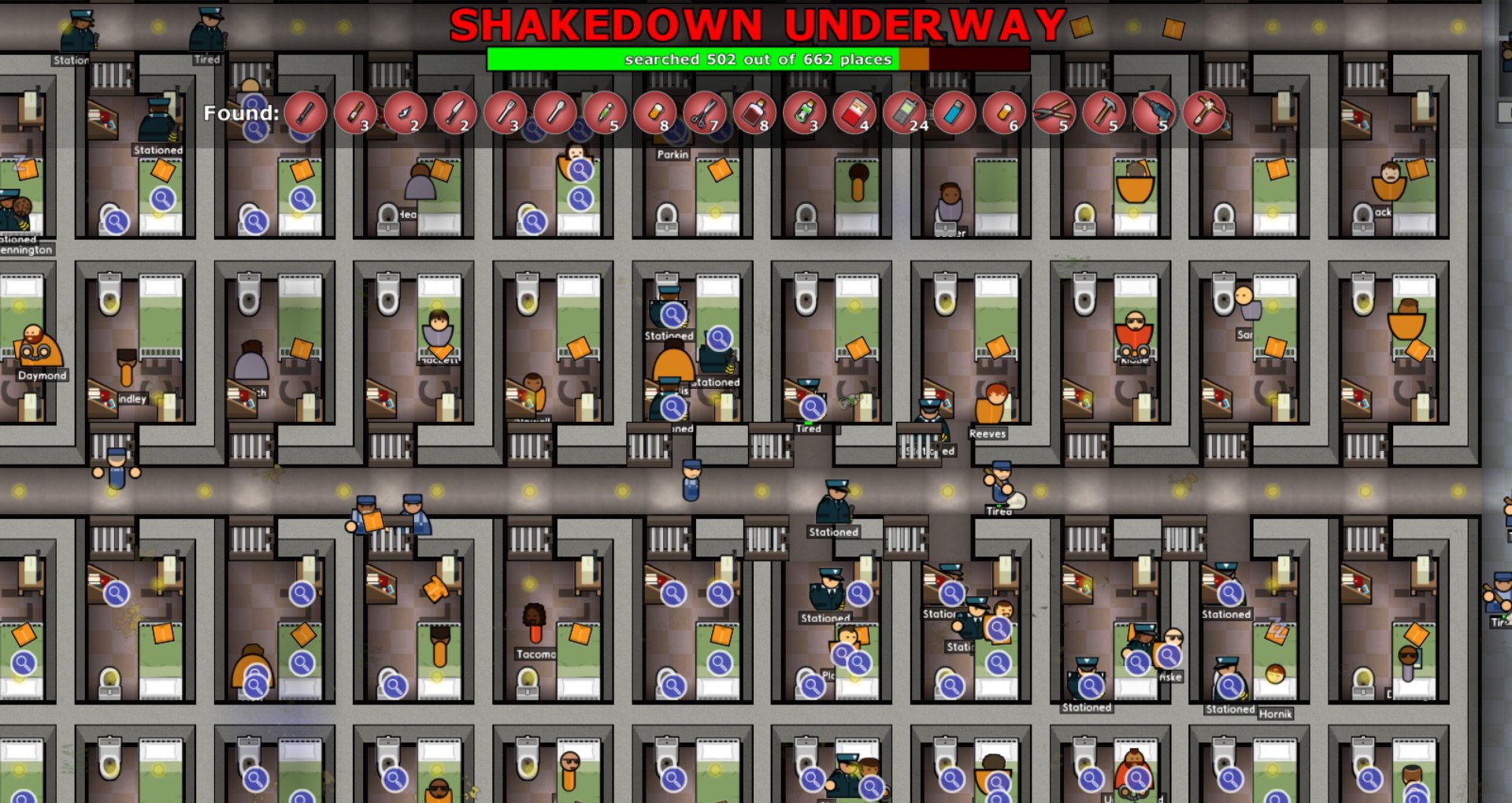
The Mean Mile
Prison Architect works well on a macro scale—managing your budget, staff, grants, utilities, and infrastructure, but at times requires a laser-like focus on specific issues and even on individual inmates. After a virus swept through the population I had to check each prisoner for infection (their faces turn green) and lock the sickies in their cells, one by one, to avoid spreading the disease further. Another time, an informant told me one inmate, a former prison guard, had been targeted for a hit. This inmate was important to me: I was chasing educational grant money and he was one of the very few students qualified to pass my general education class. I threw the target in solitary for an extended stay so no one could murder him while I set about planning a new protective custody wing, a tiny prison within my prison. When I was done I went to collect him from his cell but found his stay in solitary had expired because I'd left the clock running while planning my new facility. Whoops. After a frantic search I found him in the genpop canteen just in time to watch him get shivved by another prisoner. Double whoops.
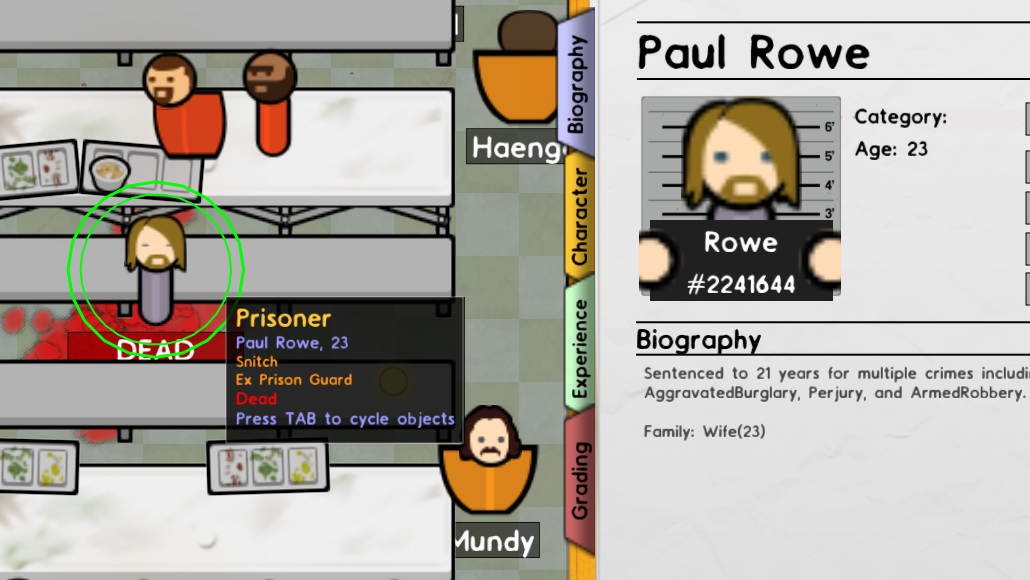
Surrounding the simulation on all sides is cash. This is a privately run prison, which means the intake of new prisoners provides you with money, tempting you to cram as many bodies, sometimes too many, into your jail. The grants system, in addition to giving you more money, provides much-needed mission structure in the initially daunting sandbox mode. Applying for grants for programs like alcohol or drug addiction treatment, security training, labor skills classes, and even parole hearings and family visitations, gives you a list of criteria to meet, rewarding you in stages with cash. If you choose to play with random events enabled, you'll also experience kitchen fires, utility failures, and specific demands from the mayor, which periodically forces you to deal with a crisis, and sometimes several at once.
The tutorial campaign doesn't teach you, step-by-step, how to build a prison. Instead it puts you in charge of a series of prisons, each needing various problems solved, giving you a variety of experiences before you start your own prison. It's also the only part of the game to include human drama as you experience the personal stories of several inmates and perhaps get a chance to reflect on the tragic results of a broken system—in sandbox mode there's very little to humanize your cartoony little inmates, and no time to think about anything other than problems of logic and efficiency. The downside of the campaign is that it simply doesn't give you a clue about a large number of the game's elements and features. Once I'd begun sandbox mode, I found I had to pause the game to search Google, forums, or read the wiki to a little too frequently.
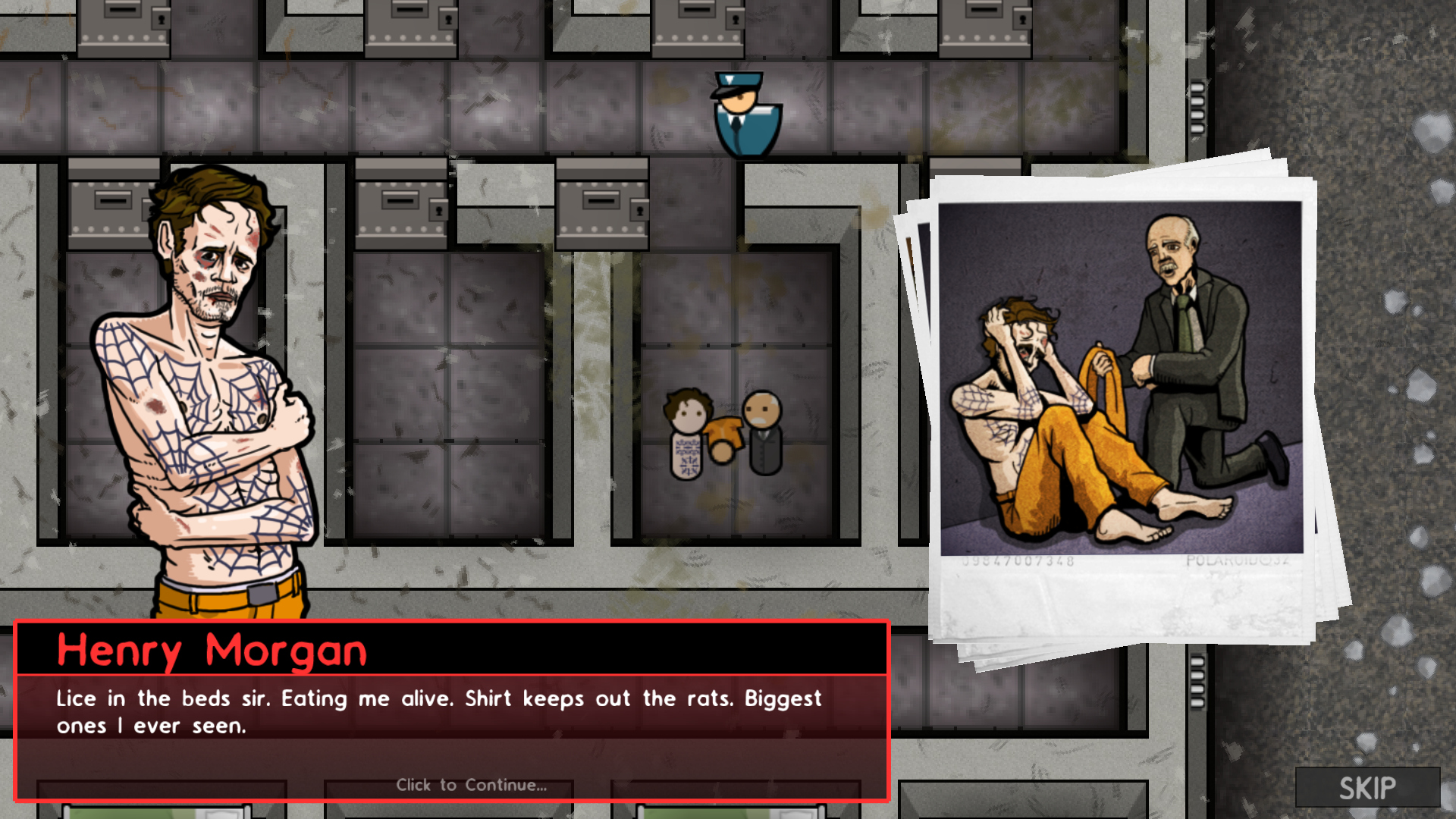
I experienced a small handful of bugs: most notably, I had to restart an entire chapter of the campaign because the game refused to recognize that I'd placed the correct number of chairs in a common room for an alcohol treatment program. PA's menus aren't great, either: every single placeable object is listed in the same menu, and the low-detail graphics make it hard to spot what you're looking for, meaning I found myself constantly doing text searches to find the right piece of equipment. (Objects in the menu are highlighted if they're needed for a room you're currently building, but if you're in the process of working on several rooms, which I often was, it's not entirely helpful.)
None of those issues prevent Prison Architect from being an incredibly engrossing balancing act, a simulation with the ability to surprise, challenge, and sometimes horrify you. While playing with a massive prison I'd downloaded from the Steam Workshop, a riot broke out because the mayor told me to remove all the TV sets from the prison or face a fine. Afterwards, while I stared at all the tiny bodies lying everywhere, drenched in blood, he called me again and casually told me I could put the TVs back. Sure, great, I'll do that once I've finished expanding the morgue. You can even experience the horrors from the other side of the bars: PA's Escape Mode lets you play as an inmate in your own jail, or one you've downloaded, and challenges you to form a gang and bust out.
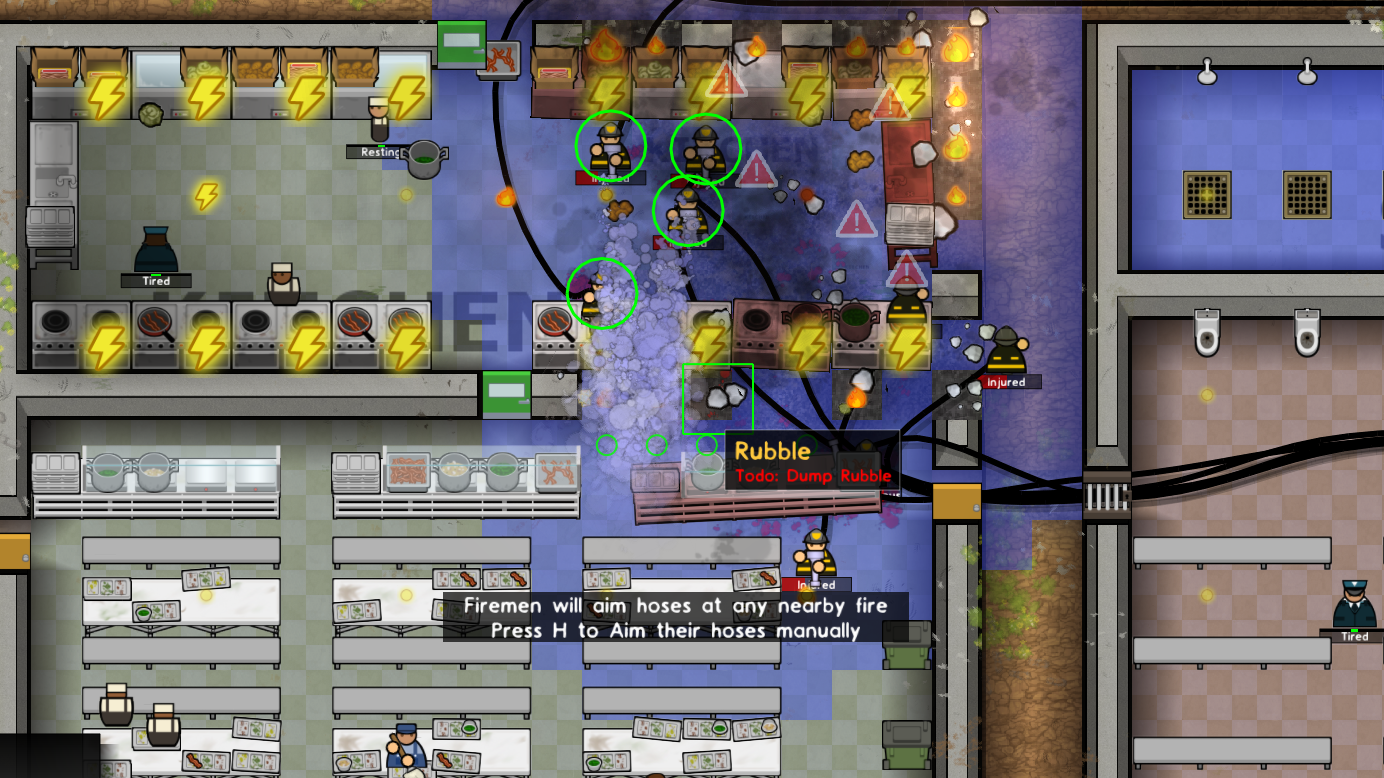
Back to my very first prison. After those five inmates tunneled to freedom, my approach changed. I never became an evil warden like you see in the movies, but I dispensed with the warm and cuddly notion that I was overseeing a bunch of citizens who could be made happy with a nice library or a pool table in the common room. I instituted regular shakedowns (searching cell blocks) and bangups (sending everyone to their cells to be frisked), and closely monitored prisoners to see who was tired during the day (as the result of staying up all night digging with cafeteria forks.) I installed metal detectors outside every single door which led to a shocking number of tools and weapons being confiscated. I bullied inmates with extended stays in solitary until they agreed to become informants. I had guard dogs patrolling cellblock corridors 24/7 and officers patrolling the perimeter of the grounds, where contraband was often found, the result of accomplices lobbing things over the walls at prescribed times. How do prisoners arrange this? Probably by using the dozens of cellphones, smuggled in with deliveries, that I find every time I do a search.
Even with those harsh new measures in place, I continued to find the beginnings of escape tunnels. Guard dogs can detect tunnels, so the inmates, rather than digging straight toward the wall, were digging in circuitous paths to avoid the patrolling dogs. Clever, I'll give them that. Soon I had hounds not just walking the interior of the cellblocks but around the outside as well, and finally the tunnel-digging ceased. I haven't lost a prisoner since, except from the occasional cafeteria shanking or overdose from smuggled drugs. That's about as happy as things get in my grim little city.
A complex, challenging, and grimly satisfying simulator.

Chris started playing PC games in the 1980s, started writing about them in the early 2000s, and (finally) started getting paid to write about them in the late 2000s. Following a few years as a regular freelancer, PC Gamer hired him in 2014, probably so he'd stop emailing them asking for more work. Chris has a love-hate relationship with survival games and an unhealthy fascination with the inner lives of NPCs. He's also a fan of offbeat simulation games, mods, and ignoring storylines in RPGs so he can make up his own.
